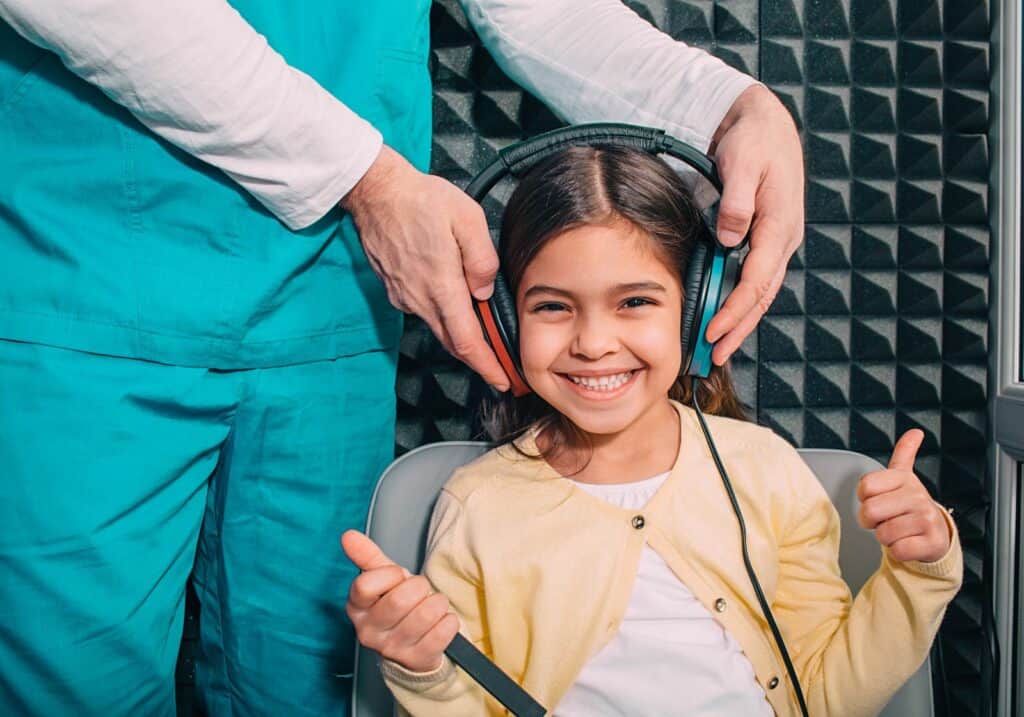March 3rd is World Hearing Day and you can participate by scheduling an appointment for a hearing test!
What causes hearing loss?
Hearing loss can be caused by several factors that damage the auditory system – the sensory system for hearing. Common causes include:
- Loud noise: one time or consistent exposure to loud noise can permanently damage the sensory cells in the inner ear. These cells play a critical role in how sound is processed. These cells convert incoming soundwaves into electrical signals which get sent to the brain. The brain then continues processing these cells which includes assigning meaning to them, allowing us to understand what we hear. Loud noise can desensitize and weaken these cells, reducing their capacity to effectively process soundwaves. This results in the brain receiving less auditory information, producing noise induced hearing loss.
- Aging: age is the strongest indicator of hearing loss. The risk of developing age related hearing loss, also known as presbycusis, increases with age. This can be caused by a few factors including: the cumulative impact of noise exposure over a lifetime, changes to the ear that may be experienced over time, or existing medical conditions that increase the risk of hearing loss and disproportionately impact older adults.
- Medical conditions: substantial research shows that several medical conditions can increase the risk of developing hearing loss. This includes cardiovascular disease, hypertension, and diabetes. These conditions can involve damage of blood vessels which can restrict blood flow throughout the body, including the ears. This can disrupt the way sound waves are absorbed adn processed, causing hearing loss.
- Head injuries: over 3 million head injuries occur every year. Head injuries range from mild (concussions) to severe (traumatic brain injuries). They can damage the bones in the middle ear, rupture the eardrum, and/or impair the sensory cells in the cochlea. This type of damage can prevent these components from performing their essential functions, causing hearing loss.
Other causes of hearing loss include inner ear disorders, autoimmune conditions, and chronic ear infections.
What are common hearing loss symptoms?
Hearing loss reduces capacity to hear and process speech as well as sound. This produces a range of symptoms including the following:
- Tinnitus: a buzzing or ringing noise in one or both ears that only you can hear.
- Sounds are muffled or distorted.
- Difficulty hearing, especially in places with background noise (like restaurants).
- Lip reading to help identify individual words.
- Frequently asking others to repeat what they said, speak louder, and/or slower.
- Saying “huh” or “what” often in response to others.
- Needing to turn up the volume on your TV, phone, or other electronic devices.
- Moving to a quieter room to be able to hear better.
- Pretending to hear to get through a conversation.
- Being able to hear more clearly out of one ear compared to the other.
- Keeping conversations short.
- Skipping social activities and spending less time with loved ones to avoid conversations.
These symptoms can be mild to severe, depending on the degree of impairment you are experiencing. To cope with symptoms, people often avoid conversations as much as possible. Social withdrawal is a major effect of hearing loss. Not only does this impact relationships and social connection, but it can take a toll on mental health by contributing to depressive symptoms. If you recognize any of these symptoms, it is important to have your hearing evaluated.
How is hearing loss treated?
Fortunately, there are effective ways that hearing loss is treated. Hearing aids are the most common treatment and provide an effective solution to hearing loss. Hearing aids are electronic devices that are designed to absorb and process speech as well as sound. This provides the ear and brain with ample support, alleviating hearing loss symptoms and maximizing hearing capacity. Hearing aids not only improve hearing but also communication. People have a greater capacity to hear and engage in conversations with greater ease and comfort.
Celebrate World Hearing Day by Scheduling a Hearing Test
World Hearing Day is a great reminder to prioritize your hearing health and wellness. You can do this by scheduling an appointment for a hearing test which involves a painless and non-invasive process. Contact us today to schedule an appointment for a hearing consultation!





